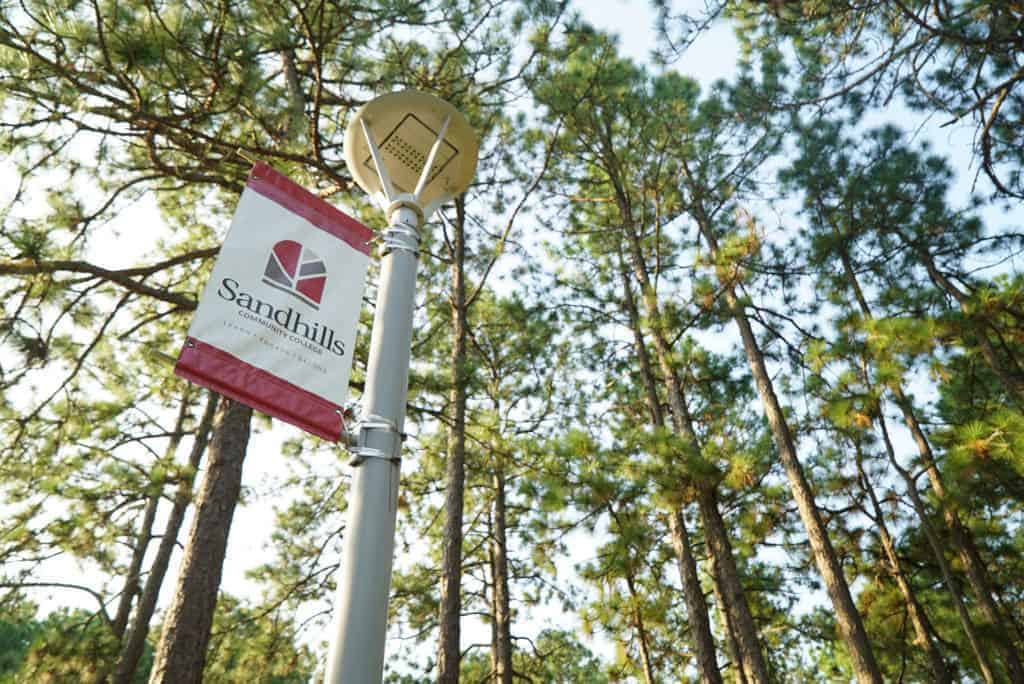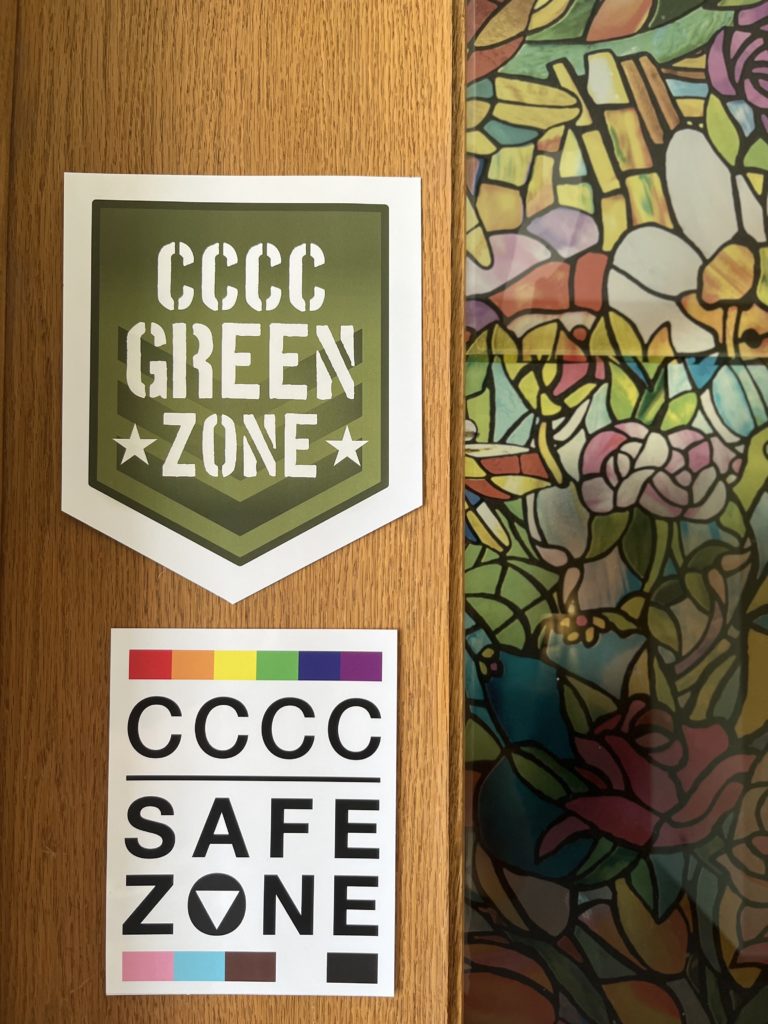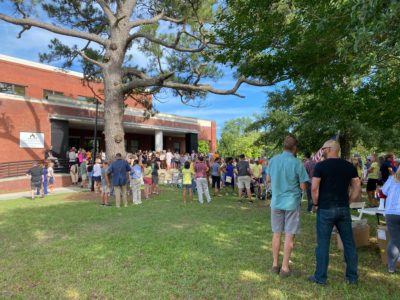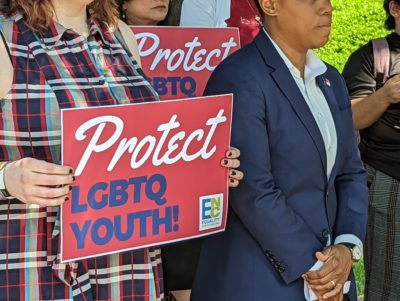

Share this story
- N.C. community colleges are working to provide specific support for LGBTQ+ students and faculty like training, aid, and affinity clubs.
- “Students are not going to academically succeed in an environment where they don't feel accepted, elevated, and supported,” Holmes said. “That's our primary goal: For students to be successful."
|
|
The first week Ethan Jones attended a Gay-Straight-Transgender Alliance (GSTA) meeting at Sandhills Community College, he was the only student there.
“I wanted to get more involved with the community,” said Jones, who is now the club’s president. “Because I hadn’t really met any other gay people until the meeting.”
The next week, another student joined Jones. Together, they worked to advertise the club so more people would come.
A few weeks later, the club had more than 10 regular attendees.
“We’ve just been trying to grow it,” said Jones, who just completed his first year at Sandhills in the college’s professional pilot program. “I really just wanted to see more like-minded people. More people like myself trying to get a community together to share our experiences with each other, like a support network.”
In recent years, most four-year institutions have offered more resources specifically for LGBTQ+ students. At community colleges – where students don’t live on campus and often commute from multiple geographical areas – LGBTQ+ students like Jones sometimes struggle finding targeted support. A lack of streamlined pronoun change processes and affirming therapy can create additional barriers for LGBTQ+ students, Jones said.
Many LGBTQ+ people, but youth in particular, struggle with mental health due to discrimination or a lack of support. But LGBTQ+ youth ages 13-24 report significantly lower rates of attempting suicide when their school or community is accepting of LGBTQ+ people, according to the Trevor Project’s 2022 National Survey on LGBTQ Youth Mental Health.
Community colleges across North Carolina are increasingly working to provide specific support for LGBTQ+ students and faculty. Many campuses are providing training, aid to LGBTQ+ students, and promoting LGBTQ+ affinity clubs and spaces on campus.
At Nash Community College, the school’s Culture of Blue Love student program is a large part of caring for all students, said Marbeth Holmes, the college’s dean of student success. Started in 2014, the program offers aid to students, as well as a variety of wellness and academic assistance programs. The college’s student wellness center provides specific resources for LGBTQ+ students, Holmes said. The college’s entire success network team completes Safe Zone training. Such training introduces participants to topics like sexual orientation and gender identity. People who complete the program receive a placard or pin which visibly identifies them as allies.
“Students are not going to academically succeed in an environment where they don’t feel accepted, elevated, and supported,” Holmes said. “That’s our primary goal: For students to be successful. And for Nash to be an accepting, validating, supportive institution of higher learning.”
System office supports
The N.C. Community College System (NCCCS) is made up of 58 campuses across the state with individual presidents, boards, and budgets.
Still, the community college system is working to provide an increased number of systemwide support for colleges to take advantage of – including those for LGBTQ+ students and faculty.
The system’s Student Success Center, for example, offers several workshops each year focused on supporting LGBTQ+ students. Those workshops discuss topics like creating inclusive spaces for LGBTQ+ students, LGBTQ+ student equity, and transgender student equity.
“Those workshops are open to faculty and staff who are interested in looking at their own practices, and looking at resources that they’re providing in the classroom for LGBTQIA+ students,” said Delores Ali, executive director of the Student Success Center.
LGBTQ+: an acronym for lesbian, gay, bisexual, transgender, and queer/questioning. The “+” is for other sexual identities/orientations not covered in the acronym.
LGBTQIA+: an acronym for lesbian, gay, bisexual, transgender, queer/questioning, intersex, and asexual. The “+” is for other sexual identities/orientations not covered in the acronym.
Many efforts to support students previously took place at a grassroots level, said J.W. Kelley, NCCCS associate vice president for student services. The system is working to further structure its supports so colleges know about resources without asking for them.
One example is the system’s work to streamline the process of updating student preferred names in Colleague, the learning management system used on NCCCS campuses. The student support unit is also working to develop more campus culture and support resources from the system.
“The work of serving this group of students has been going on for some time,” Kelley said. “Our colleges and the agency, we exist to serve students and all their uniqueness. If they have additional needs that are unmet, then we want to try to meet those needs – because we’re about students.”
J.W. Kelley, NCCCS vice president for student services
Safe zone training ‘really makes a difference’
LGBTQ+ training for faculty is a large part of supporting LGBTQ+ students, advocates say.
At Nash, Holmes said such training is offered on campus to all faculty and required for success coaches and success network team members. This is to ensure all students trust campus resources are a safe place for them, Holmes said.
At Sandhills, Jones said seeing faculty and staff allies who completed training makes a big difference.
“It’s definitely a good place to talk to those people,” he said.


Sometimes professors or students make homophobic statements in class, Jones said. Knowing there are professors to talk to, he said, helps LGBTQ+ students navigate those situations. The two advisors of the college’s GSTA — Jami Dandridge and Sue Senior — are especially helpful.
“They’re always saying that they’re open to talk anytime you need to. Their offices are always open if you want to go there,” Jones said. “Anytime you want to talk, vent, get support, get advice, they’re always there to help.”
Adam Wade, director of admissions at Central Carolina Community College (CCCC), said the college worked with UNC’s LGBTQ Center in 2018 to start a CCCC Safe Zone training program. Previously, the school contracted with third-party training providers.
“My motivation for something like this initially came from some conversations with our LGBTQ-ally group several years before. They talked a lot about how much the visible things around campus – like our rainbow stickers and Safe Zone signs – make a difference with people and create a sense of belonging for students on campus,” Wade said. “I also identify as a cisgender, gay male, so it was important to me as an employee to ensure that we’re showing some visibility for LGBTQ students, staff, and faculty.”
Since then, Wade said the program has been a widely supported “big push on campus.” The first in-person trainings since the pandemic recently resumed. About 80 faculty and staff members have been trained as allies since 2018.
CCCC changed its training so there are two segments — one to learn foundational vocabulary and practices, and a second to certify allies. During the training feedback process, CCCC also created a process for changing preferred names and pronouns. The college always wants to emphasize research and data in its programs, Wade said.
“There’s a lot of support and foundation for this work at the four-year setting, but not at the two-year setting,” he said. “When you go to search LGBTQ student experiences in the community college setting, it’s a lot more limited. But the research is out there that our visibility and Safe Zone programs, having resources available for students, really makes a difference in their experience.”
Affinity groups ‘provide connection and safety’
Student affinity groups like Sandhill’s GSTA are another part of creating more welcoming campuses.
At Forsyth Technical Community College, the PRIDE club hosted a Pride Fest last March. The event was the club’s first following an extended remote-learning hiatus.
Rick Foster, student success advisor at Forsyth, helped revamp the club initially with five students. Foster, who is now the club’s advisor, said his perspective changed as an adult learner at Forsyth a decade ago.
“I feel very, very lucky to be able to interact with our students,” he said. “And I’m 51 years old, so they’re all kids to me, even if they’re older. They’re amazing – and they’ve shown me how to be a better person.”
The club is planning two more events for this calendar year and working to keep growing the club. Community colleges sometimes struggle more than four-year schools to maintain strong clubs, CCCC’s Wade said, due to the more frequent turnover of students.
At Sandhills, Jones said the club is still working to grow the club, including more straight allies. Eventually, club members want to offer financial support for transgender students and to get involved in community service.


Sandhills PRIDE is a nonprofit organization supporting the LGBTQ+ community in Pinehurst, with groups and activities in other surrounding areas. The organization primarily serves middle and high school students, Executive Director Lauren Mathers said. It also hangs event fliers at local community colleges like Sandhills and CCCC. Mathers is also working with local community college clubs to form better partnerships with students.
“This is a difficult area to be a member of the LGBTQ community and to be out,” Mathers said. “So the most important thing we do is to provide connection and safety. Honestly, that’s what almost everything we try to do is around – providing safe places for our allies and our community to be together.”
Everyone needs to feel like they have a place they belong, Foster emphasized.
“The main thing we can offer students is just you know, every Friday at 3:00, I have a conference room booked. We all sit down and you can come in and let your hair down and be yourself and know that this is your college – this is a safe place,” he said. “And that means a lot to me that it is a safe place, and I’ll do everything in my power to protect the students.”
For Foster, who attended Forsyth in his 40s after his “life has just fallen to pieces,” the community college provided a fresh start and sense of purpose. He wants to ensure his students also find that direction and welcome.
“Forsyth has a really strong place in my heart, and I want it to be that place for my students,” he said. “I’ll fight to do that – any way we can to make sure they do feel safe and like they have a place where they belong so that they can succeed.”
‘How we support every single student’
Providing accessible aid to students is another important component of supporting LGBTQ+ students, Nash’s Marbeth Holmes said.
A committee completes internal audits on how the school serves different student populations as part of Nash’s diversity, equity, and inclusion (DEI) work. The college’s Blue Love program offers various financial aid to all students, which Holmes said many LGBTQ+ students benefit from.
The program connects students to food and emergency housing, Medicaid, and free counseling and therapy services, among other things, according to the college website.
“Even before DEI became the trend to pay attention to, we were already serving the whole student and working toward that,” Holmes said. “It’s good for retention, it’s good for enrollment. But even more than that, it’s just the nature of the college, to love on our students, regardless of anything.”
Marbeth Holmes, Nash Community College
At Wake Technical Community College, a website page for LGBTQIA students includes a list of resources, including the college’s food pantry, library resources, and wellness center.
Wake Tech’s LGBTQIA website also links to Full Spectrum, the college’s Gender and Sexualities Alliance (GSA). The student-led club has a South and North campus location and contact. Durham Technical Community College also has a student affinity group, Sexuality Pride Educate Connect Trust Respect Unity Multiplicity (SPECTRUM); the college has a Safe Zone Committee of faculty and student advocates. Both colleges list local and state resources. Wake Tech also provides information about how to change your name in the school’s system.
As community colleges continue to embark on this work, Wade said consistency is key. Building a culture of inclusivity is something that takes time, he said.
“In a time where everyone is concerned about our enrollment and wanting to ensure that we are educating students to enter career pipelines in our communities, shouldn’t we be considering how we support every single student that walks through our door?” he said. “As we think about the why, and the reasoning behind a Safe Zone Program, or LGBTQ supports, it’s wanting to create that sense of belonging: you belong here, we support you, and we want you to be successful.”
Are you a LGBTQ+ student or faculty member interested in sharing your story? Or a community college proud of your work in this area? We’d love to hear from you. Email Reporter Hannah McClellan at hmcclellan@ednc.org.





